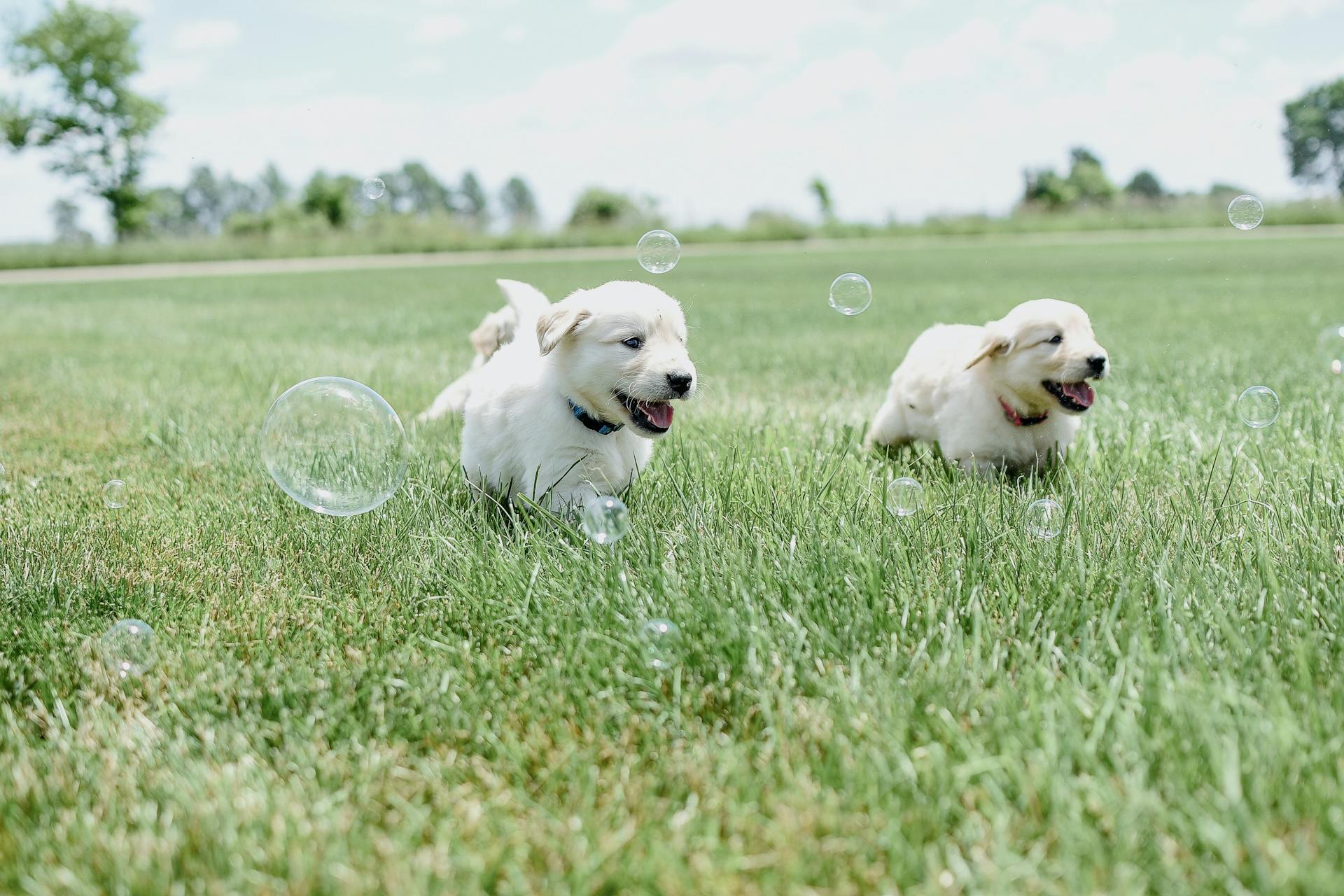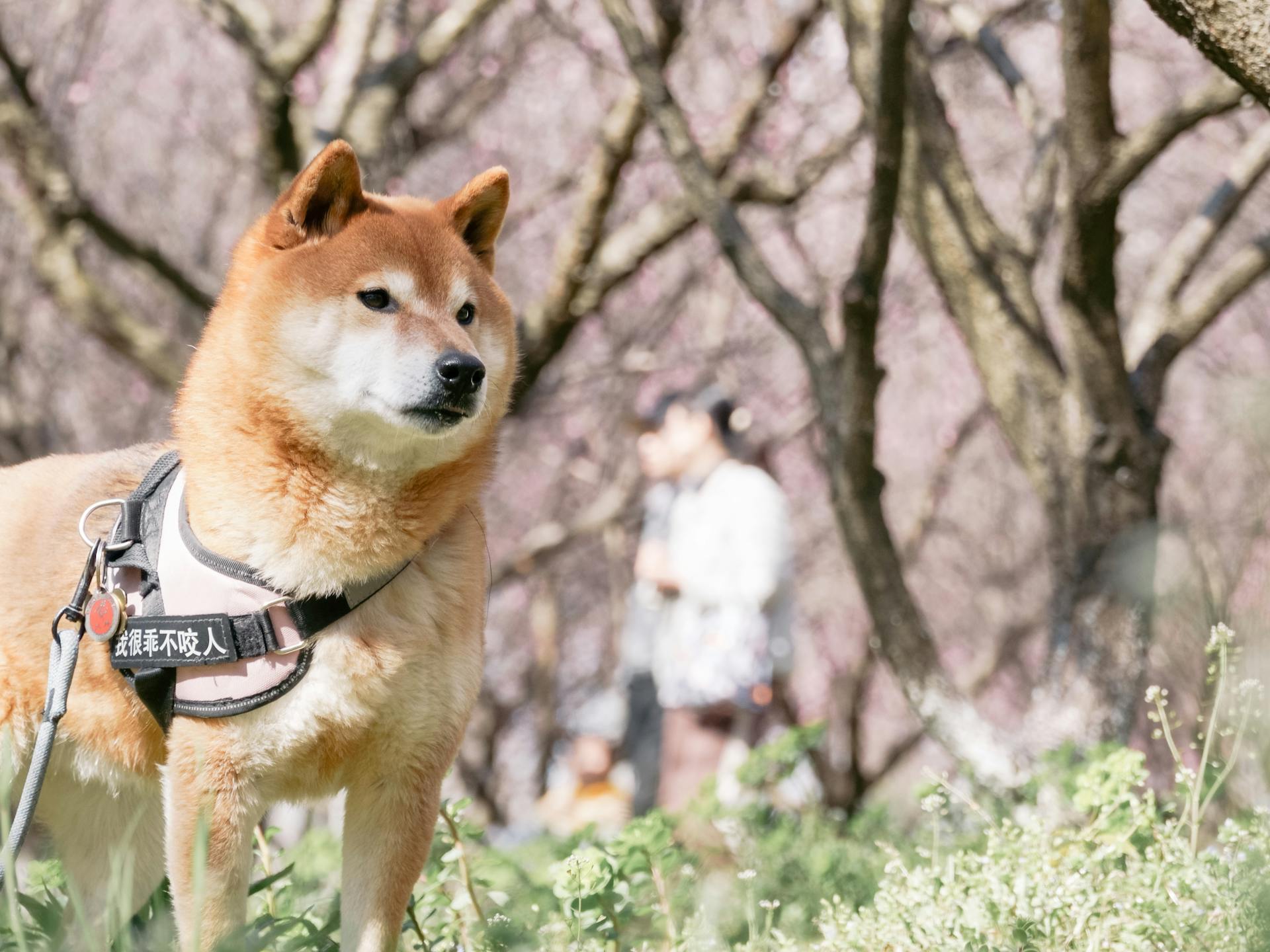
Aussiedoodles are a cross between an Australian Shepherd and a Poodle, typically a Standard Poodle. They're often referred to as one of the most intelligent breeds around.
These dogs inherit the intelligence and trainability from their parent breeds, making them highly trainable and responsive to commands. In fact, with proper training, Aussiedoodles can learn over 200 commands and tasks.
What Is an Aussiedoodle?
The Aussiedoodle is a cross between an Australian Shepherd and a Poodle. This hybrid breed combines the intelligence and energy of the Australian Shepherd with the loyalty and trainability of the Poodle.
Aussiedoodles are often considered medium to large-sized dogs, weighing anywhere from 20-60 pounds (9-27 kg) and standing between 15-23 inches (38-58 cm) tall at the shoulder. They can come in a variety of colors, including black, blue merle, red merle, and silver.
As a cross between two intelligent breeds, Aussiedoodles are highly trainable and thrive on mental stimulation.
You might enjoy: Aussiedoodle vs Australian Shepherd
Definition
The Aussiedoodle is a crossbreed dog that combines the characteristics of an Australian Shepherd and a Poodle.
These two parent breeds are often chosen for their intelligence, loyalty, and trainability, making them a great combination for a family pet.
The resulting Aussiedoodle can inherit the low-shedding coat of the Poodle, which makes it a popular choice for people with allergies or who prefer less dog hair.
Origin
The Aussiedoodle is a relatively new hybrid breed, likely originating in the United States within the last few decades.
Australian Shepherds were actually developed in the western United States in the 19th century as herding dogs. Despite their name, they have no direct connection to Australia.
Poodles have a long history as water retrievers in Germany and France, which is quite different from their role in creating the Aussiedoodle breed.
You might like: What Is a Mini Aussiedoodle
Physical Characteristics
Aussiedoodles have a coat that can range from medium to medium-long, depending on their parents.
You might like: Medium Aussiedoodle
Their thick mop of curly or wavy hair is one of their most distinctive features, and it can be quite shaggy at times.
The size of an Aussiedoodle can vary wildly, with some getting above twenty inches on all fours.
They come in a myriad of different coat colors that genetic factors will also determine. This variety extends to their coloring as well, which can range from multiple colors throughout their fur to a rare red variation that shades the dog in a beautiful auburn hue.
The majority of Aussiedoodles will grow to be between 20-40lbs, but there are instances where they may reach toy or standard sizes.
Their coat is usually curly or wavy, with rarer variations present, and can be quite shaggy at times.
Additional reading: Mini Aussiedoodle Colors
Temperament and Personality
Aussiedoodles are exceptionally sweet animals that are happy to be fast friends with everyone.
They tend to be more keen on their immediate family and owners, making them a great choice for people with kids. Their affectionate nature also makes them easy to teach to coexist with dogs if they aren't already jumping at the nearest pooch.
Aussiedoodles are high-energy, fun-loving dogs who are very smart and eager to learn new things. They love to play fetch and chase things, which means they need both daily exercise and mental stimulation.
Their intelligence makes training more manageable, but it's essential to note that they can get restless if left alone or not properly trained at an early age. This is something to be aware of and discuss with your breeder.
Aussiedoodles are generally very friendly with other dogs and people, however, it's crucial to work with a breeder that trains and socializes their adult dogs so that they are aware of how the dogs interact with other people and animals.
Care and Feeding
To keep your Aussiedoodle happy and healthy, you'll want to make sure they get enough exercise every day. Aim for at least an hour of physical activity, which can be a combination of playtime, walks, and runs.
Regular ear checks are also important, especially after outside activities when dirt and insects can accumulate in their ears. File down your Aussiedoodle's nails about once a month to prevent overgrowth, or twice if you have hardwood floors at home.
Aussiedoodles need regular dental attention, with smaller ones requiring more frequent tooth care. Make sure to consult with your veterinarian to determine the best feeding schedule and type of food for your Aussiedoodle, as their diet will depend on their size, age, and activity level.
Nutrition and Diet
A high-quality diet is essential for maintaining the health and energy levels of an Aussiedoodle.
The amount of food your Aussiedoodle needs will depend on their size, age, and activity level. It's crucial to monitor their food intake to prevent obesity, which can lead to health issues.
You should consult with your veterinarian to determine the best feeding schedule and type of food for your Aussiedoodle.
Check this out: Mini Aussiedoodle Health Issues
Full-grown Aussiedoodles should be fed two meals a day, while puppies need to eat more frequently - between three and four times a day on a consistent schedule.
To minimize the risk of bloat, it's essential to make sure your dog doesn't ingest too much food or water too quickly. If your pup tends to wolf down their meals, consider using a slow-feeder bowl.
The guidance on how much to feed your Aussiedoodle can be found on the dog food packaging, based on weight. However, speaking with your veterinarian about portions is still the best way to keep your pup healthy.
Grooming Needs
An Aussiedoodle's daily exercise routine should last around one hour to avoid poor health and potential weight problems later on.
Their energetic nature means they need regular physical and mental stimulation, so make sure you have time for them in your schedule.
Smaller Aussiedoodles will require more frequent tooth care, but all will need regular dental attention to stay healthy.
Using a slicker brush can help reduce mats and tangles in dogs with longer hair, which is especially important if they take after their Australian Shepherd lineage.
Nails should be filed down around once a month, possibly twice, depending on the flooring of your house.
Health Issues

Aussiedoodles are generally a healthy breed, but like any dog, they can be prone to certain health problems.
Thyroid disease is one condition that Aussiedoodles may suffer from, as well as hip and joint dysplasia, progressive retinal atrophy, epilepsy, bloat, and cataracts. A healthy diet and plenty of exercise can help minimize the risk of these issues.
Even though Aussiedoodles have a lower COI (coefficient of inbreeding) due to being a mixed breed, genetic health should still be considered when breeding them. Puppies can inherit genetic conditions from both parents.
Health testing is essential for producing healthy Aussiedoodle puppies with a lower risk of developing genetic health conditions. This includes tests such as the ACVO Eye Examination and DNA-based prcd-PRA test.
Here are some recommended health tests for adult Aussiedoodle breeding dogs:
- ACVO Eye Examination
- DNA-based prcd-PRA test
- Veterinary Evaluation of Patellar Luxation
- One of the following: Basic Cardiac Exam or OFA Radiographic Elbow Evaluation
It's essential to request proof of health testing from a breeder, as this can help ensure that your puppy is less likely to develop inherited conditions.
House Training
Aussiedoodles are surprisingly easy to train, and their house training is no exception. They can learn to go potty outside quickly.
Most people find that their AussieDoodle puppies are about 90% potty trained by four months old, which is a testament to their quick minds and eagerness to please. With consistent effort, you can teach your Aussiedoodle to stay on the right track.
Smaller dogs might take a little longer to train than bigger ones, but with patience and practice, they'll get there too. Their strong herding instincts mean they need guidance on what's allowed and what's not, so be sure to teach them basic cues like "stay" and "come when called".
Adopting vs. Rescuing
If you're considering adopting an Aussiedoodle, be aware that there are no rescue organizations that specialize in this breed.
Rescue dogs often come with special needs and potential undesirable traits, so it's essential to consider these factors before making a decision.
Typing "Aussiedoodle rescue near me" or even "mini Aussiedoodle rescue near me" may lead to confusing search results with no reliable information.
Costs and Price Breakdown
The cost of an AussieDoodle puppy can vary significantly depending on several factors. Puppies from health-tested parents will generally be more expensive.
A reputable breeder should be able to explain why their puppies cost what they do, and it's not acceptable for them to simply say "this is the going price." You want a breeder who will support you through your journey of dog ownership.
The quality of care your puppy receives in its first year can impact the overall cost. Puppies that come with enhanced medical & socialization protocols, such as health warranties and lifetime breeder support, may be more expensive but can save you money down the line.
Here are some factors to consider when determining the fair price of an AussieDoodle puppy:
- Puppies raised in a home environment by a single litter at a time will cost more.
- Puppies with health warranties and lifetime breeder support will cost more.
- Puppies with enhanced medical & socialization protocols will cost more.
Keep in mind that the price range for AussieDoodles can be quite broad, from $1200 to $6000.
Training and Socialization
Aussiedoodles are highly intelligent and eager to please, making training a breeze for experienced pet parents.
Their sharp minds allow them to pick up commands quickly, but they do need mental stimulation to prevent boredom and destructive behaviors. They excel in obedience training and often thrive with positive reinforcement techniques.
With early socialization, Aussiedoodles can grow into well-rounded adults who are happy to show you how capable they are.
Training Ease
Aussiedoodles are highly intelligent dogs that make training a breeze. They excel in obedience training and can pick up commands quickly.
Their eagerness to please means they respond well to positive reinforcement techniques. This approach is especially effective when combined with early socialization.
These dogs love to play and have tasks to accomplish, which makes clicker training a great option for them. It's not uncommon for Aussiedoodles to master basic cues and learn more complicated tricks.
Teaching your Aussiedoodle to stay and come when called is vital, as their strong herding instincts can sometimes get the best of them. This simple command can help prevent unwanted situations.
Check this out: Aussiedoodle Training
Socialization with Other Pets
Aussiedoodles are not known for bullying smaller animals.
They tend to get along with most pets they meet as long as the interaction is favorable.
Meeting the other animal at an earlier age is always advantageous.
It's best to introduce them to your cat, parakeet, or exotic lizard in a monitored and controlled environment where both can get to know each other.
Choosing a Reputable Breeder
Many breeders will take a Poodle and an Aussie (Australian Shepherd) and breed them together without consideration for structure or temperament.
A reputable breeder will carefully procure breeding dogs of each pure breed that complement each other in temperament and structure, as Rebecca Creek Retrievers has done.
Worth a look: Toy Aussiedoodle Temperament
Frequently Asked Questions
What is the downside to aussiedoodles?
Potential downsides of Aussiedoodles include hyperactivity and separation anxiety, which may require extra attention and training. Temperament can also vary greatly due to their mixed breed nature
Why are aussiedoodles so expensive?
Aussiedoodles are relatively expensive due to their designer breed status. Initial purchase costs are just the beginning, with additional expenses for supplies, vaccinations, IDs, and other necessities
Which is better, goldendoodle or Aussiedoodle?
Consider an Aussiedoodle for focused training, but a Goldendoodle if you have children who'll benefit from their loving nature
Do aussiedoodles shed a lot?
Aussiedoodles do shed, but the amount varies depending on their coat type. Some Aussiedoodles with curlier coats may shed less than those with straighter coats.
Do Aussiedoodles bark a lot?
Aussiedoodles have a moderate tendency to bark, typically due to alertness, excitement, or anxiety. They are not excessive barkers, but rather vocalize when they feel it's necessary.
Sources
- https://dogacademy.org/breeds/aussiedoodle
- https://www.rebeccacreekretrievers.com/all-about-aussiedoodle-breeding-and-choosing-an-aussiedoodle-puppy
- https://www.embracepetinsurance.com/dog-breeds/aussiedoodle
- https://www.petmd.com/dog/breeds/aussiedoodle
- https://www.awesomedoodle.com/about-the-aussiedoodle/aussiedoodle-faq/
Featured Images: pexels.com


